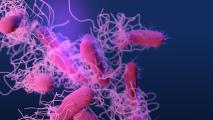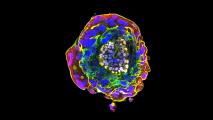Healthy sperm is one of the most important ingredients for conceiving a healthy baby. About 10% of men, however, are infertile, and often their sperm is to blame. Men who are infertile often produce some healthy sperm; however, they don’t produce enough to efficiently impregnate a female partner.
In vitro fertilization technologies help overcome these infertility challenges, but these technologies require isolating healthy sperm cells from the defective sperm. Unfortunately (and ironically), methods for isolating healthy sperm often damage them. According to a recent study, researchers at Florida Atlantic University have developed a device that isolates sperm with significantly fewer defects, and it only costs $5 to manufacture.
Sperm goes against the flow
Conventional methods of isolating sperm involve multiple centrifugation steps that damage sperm morphology and the DNA of the healthy sperm cells. Waseem Asghar, senior author of the recent study, decided to let healthy sperm cells isolate themselves. To navigate toward the egg, healthy sperm swim against the cervical mucus flow through a process called rheotaxis. Defective sperm, on the other hand, often lack the capacity to swim against the current.
To take advantage of this natural selection mechanism, the researchers developed a device with a fluid flow of 0.5 μL (microliters) per minute and chambers for loading and collecting sperm.
“Operating our chip is very easy. Once the semen is loaded into the sample inlet chamber, the competent sperm cells start moving against the fluid flow toward the collecting chamber from where they can easily be collected,” said Asghar.
To determine the efficacy of their device, Sandhya Sharma and Md. Alam Kabir compared healthy sperm isolated by their device to sperm isolated by a similar contraption that lacked flow conditions. Specifically, they compared three parameters that contribute to infertility: motility, morphology, and DNA integrity.
Happy sperm
Sperm motility isn’t just important for navigating to the egg. It also helps the sperm cell to penetrate the zona pellucida, the layer surrounding mammalian egg cells. The researchers found that sperm cells isolated with their device exhibit almost 100% higher motility than the no-flow device.
For in vitro fertilization procedures, normal morphology is imperative. One study even found that using only sperm with perfect morphology increased fertilization probability from 40% to 97%. The sperm obtained from the with-flow device provided the highest percentage (61%) of morphologically normal sperm cells, compared to the no-flow device (47%) and the unsorted sample (26%).
A high level of DNA damage in sperm does not necessarily affect fertilization, but it could affect embryo development, according to previous studies. If there is only a little DNA damage, the egg can repair it. Sperm cells from infertile men, however, have a higher rate of DNA damage compared to those of fertile men, and the egg cell often fails to repair it, resulting in termination or developmental problems. Sperm sorted from the flow conditions showed significantly lower DNA fragmentation (2.6%) compared to unsorted (18%) sperm, and slightly lower damage than sperm from no-flow sorting (3.9%).
“The assembly of the microfluidic chip is low-cost, and the reagents used in the chip to separate sperm cells are only a few milliliters, therefore, the commercial cost of the chip would be less than $5,” said Asghar. “Moreover, this technology will considerably reduce the economic burden of fertility implementations and both the chip and the sperm cells isolated from it offer great clinical significance and applicability.”
This article was reprinted with permission of Big Think, where it was originally published.






